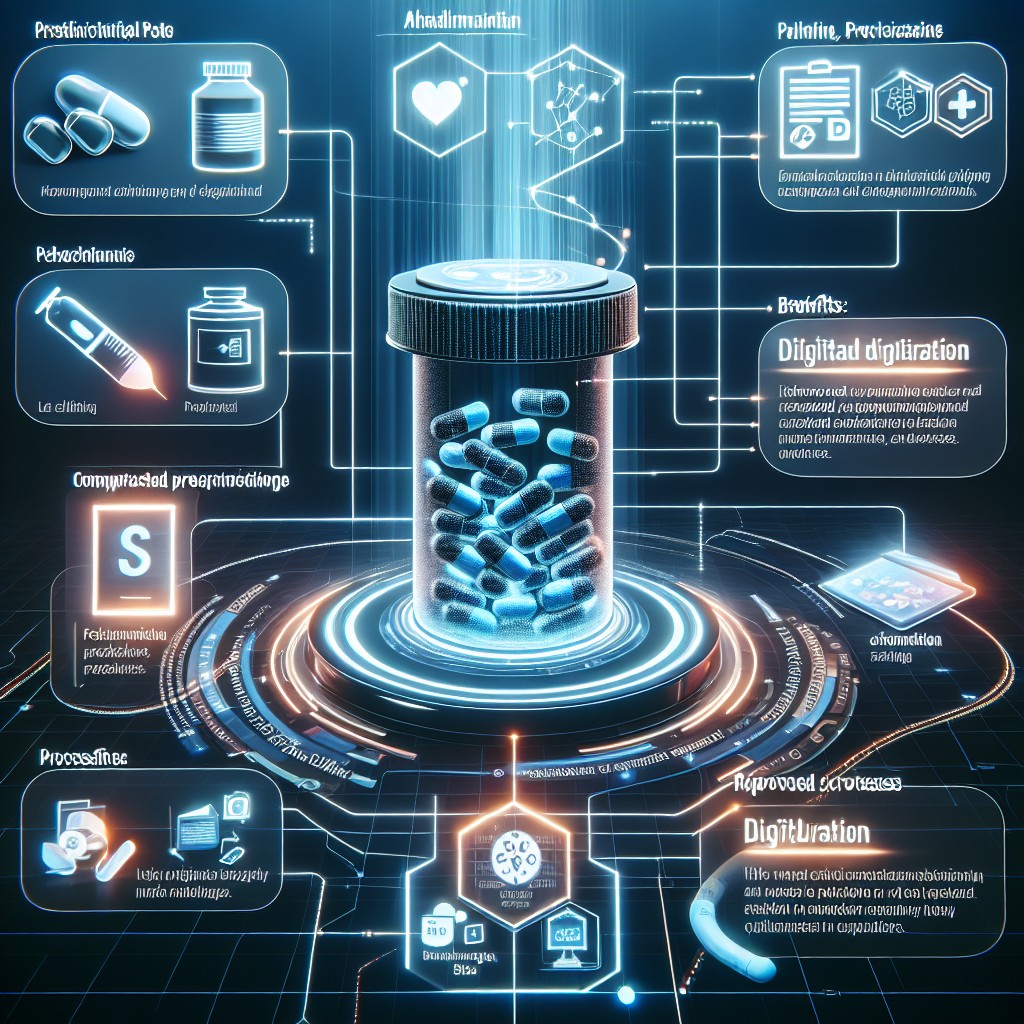- The Impact of Digital Transformation on Pharmaceutical Research and Development
- Leveraging Big Data Analytics in Drug Discovery and Development
- Telemedicine and Its Role in Pharmaceutical Services
- Blockchain Technology in Ensuring Drug Traceability and Safety
2. Leveraging Digital Technologies for Drug Development and Clinical Trials
3. Enhancing Patient Care through Digital Health Solutions in Pharma
4. Data Security and Privacy Challenges in the Digital Transformation of Pharma
5. The Role of Artificial Intelligence and Machine Learning in Drug Discovery
6. Implementing Electronic Health Records and Telemedicine in the Pharmaceutical Industry
7. Regulatory Considerations for Digital Health Products in Pharma
8. The Future of Digital Therapeutics and Personalized Medicine
9. Collaborating with Tech Companies for Innovation in Pharma
10. Building a Digital Strategy for Success in the Pharmaceutical Sector.
The Impact of Digital Transformation on Pharmaceutical Research and Development
In recent years, the pharmaceutical industry has undergone a significant transformation due to the rapid advancement of digital technologies. This digital transformation has had a profound impact on the way pharmaceutical companies conduct research and development, leading to improved efficiency, cost savings, and ultimately, better outcomes for patients.
Advantages of Digital Transformation in Pharmaceutical Research and Development:
1. Improved Data Collection and Analysis: Digital technologies have enabled pharmaceutical companies to collect and analyze vast amounts of data more efficiently than ever before. This has allowed researchers to identify patterns and trends that may have been previously overlooked, leading to more targeted and effective drug development.
2. Enhanced Collaboration: Digital tools such as cloud-based platforms and virtual collaboration software have made it easier for researchers and scientists to work together, regardless of their physical location. This has facilitated greater collaboration between different teams and departments, leading to faster and more innovative drug development.
3. Streamlined Clinical Trials: Digital technologies have revolutionized the way clinical trials are conducted, making them more efficient and cost-effective. Virtual trials, wearable devices, and remote monitoring tools have made it easier for patients to participate in trials, leading to faster recruitment and more accurate data collection.
4. Personalized Medicine: Digital technologies have enabled pharmaceutical companies to develop personalized medicine tailored to individual patients’ genetic makeup and medical history. This has led to more effective treatments with fewer side effects, ultimately improving patient outcomes.
5. Regulatory Compliance: Digital transformation has also had a positive impact on regulatory compliance in the pharmaceutical industry. Electronic data capture and management systems have made it easier for companies to comply with regulatory requirements and ensure the safety and efficacy of their products.
6. Cost Savings: By streamlining processes, improving efficiency, and reducing the need for physical infrastructure, digital transformation has helped pharmaceutical companies save costs and allocate resources more effectively. This has allowed companies to invest more in research and development, leading to more innovative drug development.
Overall, has been overwhelmingly positive. By leveraging digital technologies, pharmaceutical companies have been able to improve efficiency, collaboration, and innovation, ultimately leading to better outcomes for patients. As the industry continues to evolve, it is clear that digital transformation will play an increasingly important role in shaping the future of pharmaceutical research and development.
Leveraging Big Data Analytics in Drug Discovery and Development
The Role of Big Data Analytics in Drug Discovery
One of the key challenges in drug discovery is identifying potential drug candidates that have the desired therapeutic effects while minimizing side effects. Big data analytics can help researchers analyze vast amounts of data, including genetic information, clinical trial data, and drug interactions, to identify potential drug targets and predict how a drug will interact with the body.
By using advanced analytics techniques such as machine learning and artificial intelligence, researchers can uncover patterns and relationships in the data that would be impossible to detect using traditional methods. This can lead to the discovery of new drug candidates that may have been overlooked using conventional approaches.
The Impact of Big Data Analytics on Drug Development
Once a potential drug candidate has been identified, the drug development process can be long and costly. Big data analytics can help streamline this process by optimizing clinical trial design, predicting patient responses to treatment, and identifying potential safety issues early on.
By analyzing data from previous clinical trials, researchers can identify factors that may influence a drug’s efficacy or safety, allowing them to design more targeted and efficient trials. This can help reduce the time and cost of bringing a new drug to market, as well as improve patient outcomes.
Challenges and Opportunities
While big data analytics holds great promise for drug discovery and development, there are also challenges that must be addressed. One of the biggest challenges is the sheer volume and complexity of the data involved. Researchers must be able to effectively manage and analyze large datasets from multiple sources, which requires specialized skills and infrastructure.
Additionally, there are ethical and regulatory considerations that must be taken into account when using big data analytics in drug discovery and development. Researchers must ensure that patient data is handled securely and in compliance with privacy regulations, and that any insights gained from the data are used responsibly.
Conclusion
Big data analytics has the potential to revolutionize drug discovery and development by providing researchers with valuable insights that can lead to the discovery of new drugs and optimize the development process. By leveraging large volumes of data and advanced analytics techniques, researchers can accelerate the pace of drug discovery, reduce the time and cost of bringing new drugs to market, and improve patient outcomes.
Telemedicine and Its Role in Pharmaceutical Services
Benefits of Telemedicine in Pharmaceutical Services
There are several benefits of incorporating telemedicine into pharmaceutical services:
| Benefit | Description |
|---|---|
| Convenience | Patients can consult with healthcare providers from the comfort of their own homes, eliminating the need to travel to a physical pharmacy. |
| Accessibility | Telemedicine allows patients in remote or underserved areas to access pharmaceutical services without having to travel long distances. |
| Efficiency | Healthcare providers can quickly assess patients’ needs and prescribe medications, reducing wait times and improving overall efficiency. |
| Cost-effectiveness | Telemedicine can lower healthcare costs by reducing the need for in-person visits and streamlining the prescription process. |
Challenges of Telemedicine in Pharmaceutical Services
While telemedicine offers many benefits, there are also challenges that need to be addressed:
| Challenge | Description |
|---|---|
| Regulatory issues | There are complex regulations governing telemedicine, including licensure requirements and reimbursement policies. |
| Security concerns | Protecting patient data and ensuring the security of telemedicine platforms is crucial to maintaining patient trust. |
| Technical limitations | Not all patients have access to reliable internet connections or devices, which can limit the effectiveness of telemedicine services. |
Future of Telemedicine in Pharmaceutical Services
Despite these challenges, the future of telemedicine in pharmaceutical services looks promising. As technology continues to advance and regulations evolve, telemedicine is expected to play an increasingly important role in providing convenient and accessible healthcare services to patients around the world.
Blockchain Technology in Ensuring Drug Traceability and Safety
Drug traceability is a critical aspect of the pharmaceutical industry as it involves tracking the movement of drugs from the manufacturer to the end consumer. This is important to ensure that counterfeit drugs do not enter the supply chain and that the drugs are stored and transported under proper conditions to maintain their efficacy and safety.
Blockchain technology can play a crucial role in ensuring drug traceability by creating a decentralized and transparent ledger that records every transaction involving a drug. Each transaction is recorded as a block, and once added to the blockchain, it cannot be altered or deleted, ensuring the integrity of the data.
One of the key benefits of using blockchain technology for drug traceability is the ability to create a secure and tamper-proof record of each drug’s journey through the supply chain. This can help in identifying and eliminating counterfeit drugs, reducing the risk of drug diversion, and ensuring that the drugs are stored and transported under proper conditions.
In addition to drug traceability, blockchain technology can also enhance drug safety by providing a secure platform for storing and sharing information about the drugs. This can include information about the drug’s composition, manufacturing process, expiration date, and any potential side effects or interactions with other drugs.
By using blockchain technology, pharmaceutical companies can create a secure and transparent system for sharing this information with regulators, healthcare providers, and patients, ensuring that everyone involved in the drug supply chain has access to accurate and up-to-date information about the drugs.
To illustrate how blockchain technology can be used in ensuring drug traceability and safety, let’s consider a hypothetical example of a blockchain-based system for tracking a drug from the manufacturer to the end consumer.
| Drug Traceability and Safety Blockchain System |
|————————————————-|
| Manufacturer | Distributor | Retailer | Consumer |
|————–|————-|———-|———-|
| Manufacturer produces the drug and records the transaction on the blockchain. | Distributor receives the drug from the manufacturer and records the transaction on the blockchain. | Retailer receives the drug from the distributor and records the transaction on the blockchain. | Consumer purchases the drug from the retailer and can verify the drug’s authenticity and safety by scanning a QR code on the packaging. |
In this example, each transaction involving the drug is recorded on the blockchain, creating a secure and transparent record of the drug’s journey through the supply chain. This can help in identifying any discrepancies or irregularities in the supply chain and ensuring that the drugs are stored and transported under proper conditions.
Overall, blockchain technology has the potential to revolutionize the pharmaceutical industry by enhancing drug traceability and safety. By creating a secure and transparent system for tracking drugs through the supply chain and sharing information about the drugs, blockchain technology can help in ensuring that patients receive safe and effective medications.
- Digitization in the pharmaceutical sector - 3 September 2024
- The use of laser cleaning in the removal of adhesive residues from packaging materials. - 4 April 2024

